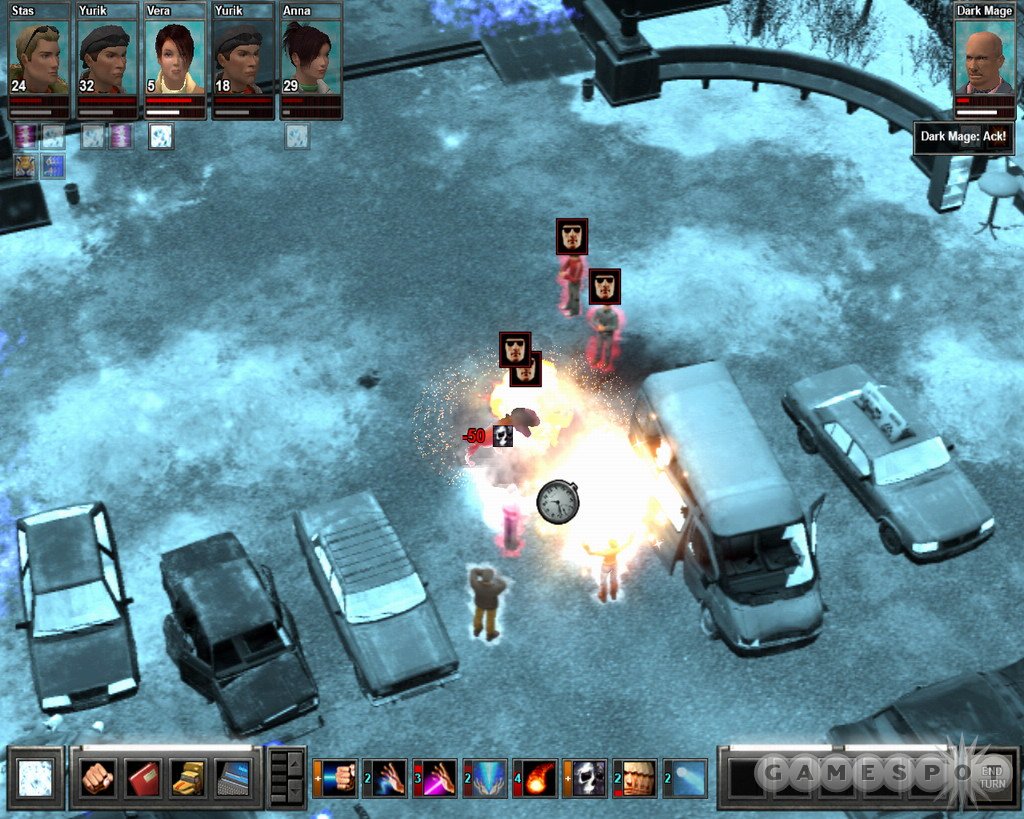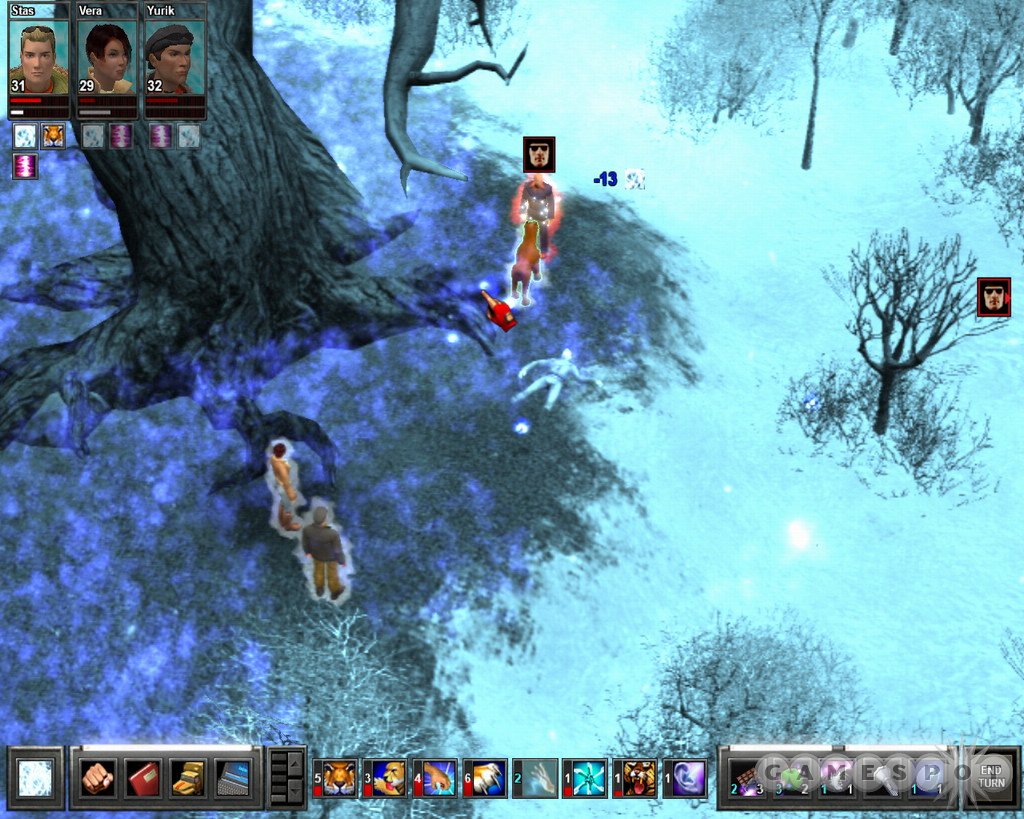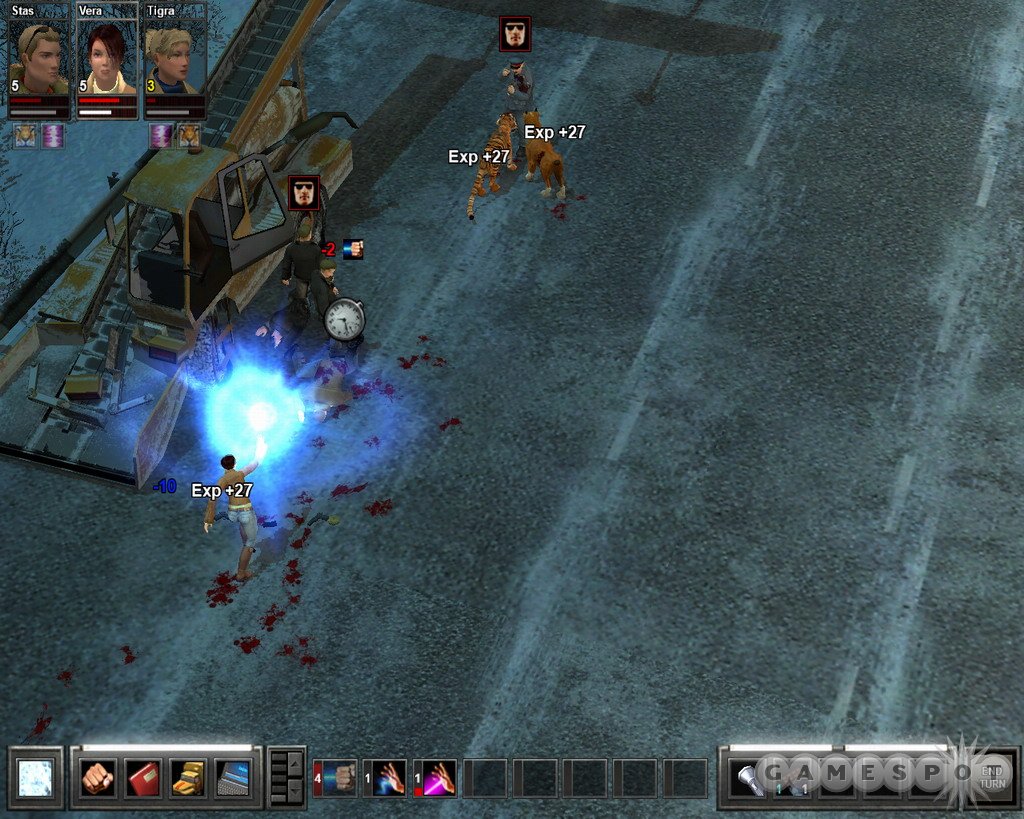The Night Watch movie set box office records in Russia, but in the United States it's still relatively unknown. Recently the movie was released on DVD in North America, and as you might expect from a movie about vampires, sorcerers, and the supernatural, a video game adaptation has shown up as well. Rather than taking the more obvious route of a standard third-person action adventure game, developer Nival Interactive has created a turn-based role-playing game based on its Silent Storm engine. The mention of Silent Storm is enough to catch the attention of strategy fans everywhere, but Night Watch fails to live up to its pedigree. The game does have a genuinely interesting story that complements the movie well, but it's too shallow and repetitive to satisfy strategy vets, and too ugly and awkward to appeal to anyone else.

Night Watch the game is set in the same world as the movie, but it follows a different story. The game opens with a man named Stas on top of a building with a sniper rifle trained on an unsuspecting woman. Apparently Stas' mother is sick, and he needs some quick cash in order to afford her necessary treatment. He takes an assassination job, but when it comes time to pull the trigger, Stas has second thoughts. Just then, some people appear out of thin air and Stas is informed that he is an "other."
See, in the world of Night Watch, there's a constant struggle that takes place between the forces of light and the forces of darkness. The forces of darkness like to terrorize the human population, so the forces of light have to keep them in check. Each force is composed of an army of people who have supernatural powers. The problem is that the two forces are so equally matched that if they were ever to attempt an all-out war it would end up destroying both forces, along with the rest of the world. So, for the sake of survival, the dark others and the light others sign a treaty that makes it a crime for others to engage in combat. The light others keep an eye on the dark others during the night watch, and the dark others keep an eye on the light others in the day watch. Of course, it wouldn't be much of a story if the two forces always played by the rules, so instead of all-out warfare the others often resort to trickery and deception to get their way.
Stas comes into all of this because he's a sort of undeclared other, which means he's an other who hasn't yet been drawn to the light or the dark. In an attempt to turn him toward the darkness, the dark others set him up on the assassination mission, knowing that he couldn't be a member of the light side if he were a cold-blooded killer. The light others catch on and stop him before he commits the act, thus recruiting him to the light side. Stas then begins his life as a light other, enforcing the law of the treaty, protecting the innocent, and so on. The story in the game actually does a better job of explaining some of the more abstract concepts than the movie does, so even if you haven't seen the movie you'll still be able to catch on quickly.
Night Watch is a modern-day turn-based strategy game involving vampires, werewolves, witches, and a wide variety of other supernatural creatures. You can have anywhere from one to four characters in your party, although your party is determined by the story and you have no say in who you get to recruit. Each of your characters can be one of three classes. The shape-shifter is the equivalent of a fighter due to its high defense and melee attack capabilities; the mage has weak defense but powerful attack spells; and the enchanter can imbue everyday objects like flashlights and apples with magic energy that grants powerful special effects. Each class has around 20 spells and abilities that become available as you kill enemies and earn experience. Even then, the character customization feels extremely limited with only three classes to choose from, and the new spells and abilities you gain access to are hardly worth the effort. In fact, you'll probably find yourself using the same few basic tactics right up to the end of the game.

Everything you do in Night Watch requires action points, which are replenished each turn. When it's your turn you can move your characters, cast spells, attack, and use items. You usually won't have many action points to spare, so you'll average about three actions per turn for each character. When you're finished you simply hit the end turn button and wait for your enemies to act before doing it all over again. Since movement is a massive drain on your action points, you'll find that the most efficient strategy is to stand in one spot and launch ranged spells or repeated attacks at nearby enemies, which doesn't exactly make for exciting or challenging tactical battles.
It doesn't help that the movement in the game is somewhat awkward and very imprecise. It seems simple, because you just have to click the spot on the map where you want your character to go, and the artificial intelligence is fairly apt at finding paths around obstacles and through doors and such. However, the movement lacks precision, usually getting your characters only within the general vicinity of where you clicked. If there are obstacles or other characters nearby it becomes a jumbled mess, which makes it difficult to select a target when attacking or using items. You can rotate and zoom in the camera, but that rarely offers a better perspective on the action.
One unique aspect of Night Watch is the way that you can travel between two parallel worlds in the midst of battle. When battles begin you're in the real world, but if you have enough action points you can step into the "gloom," which is an alternate dimension where magic is stronger, but your characters are drained of energy each round. Many battles take place almost entirely in the gloom, and characters behave slightly differently depending on which realm they're in. For example, most characters will have much more available action points per turn while in the gloom than while in the normal world. But as interesting as it sounds, the gloom doesn't do much to add to the depth of the game. Usually you step into the gloom on the first turn of the battle, fight until all the enemies are dead, and then step out of the gloom to move on to the next battle.
The battles in the game take place on large battlefields set in subways, castles, parks, city streets, and more. But while there's a decent variety to the landscape, the actual battles become repetitive quickly. There are very few special missions that require you to do anything other than kill every enemy you see, and you'll end up facing the same few enemies throughout the entire game. The game is actually fun for the first few battles, but beyond that nothing changes and there's no sense of progression. You just get herded from one generic battle to the next in a very linear fashion.

The presentation in Night Watch leaves much to be desired. The characters are poorly detailed, the battle animations are jerky and stilted, and the rag-doll effect is overused to the point of ridiculousness. The backgrounds are all covered with flat, dull textures and the objects that populate the environment are dull and blocky. The environments are destructible as advertised, but the way objects crumple at the slightest touch seems unnatural and out of place. Even the spell effects are dull, which is in sharp contrast to the very stylized special effects used in the movie. Thankfully the sound is much better than the visuals. There is a ton of dialogue in the game, and while it's all a bit stiff, it's actually somewhat funny at times. It might just be that the characters look so lifeless that even the slightest hint of humanity in their voices seems like an astounding accomplishment by contrast. Also, the music is actually quite good. The rock track that loops in the background is heavy enough to lend a darker tone to the game, without being overbearing. The only problem is that when you step into the gloom the music dies and you're left in relative silence.
Night Watch is a promising game in the beginning, with a unique story and accessible battle system. After the first few battles, though, the game never progresses, and instead settles into a rut of simplicity and repetition. The game could take you 15 hours or more to get through, but once you finish it the replay value is next to nothing. Furthermore, if you're expecting the same level of production and style from the game that you saw in the movie, you'll be sorely disappointed. It's true there aren't many turn-based strategy games on the market, but there are certainly better ones than this.